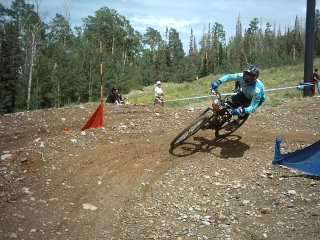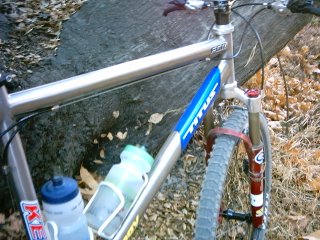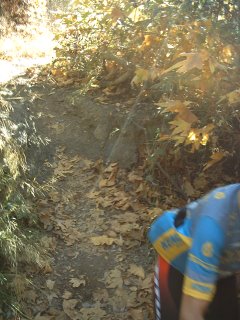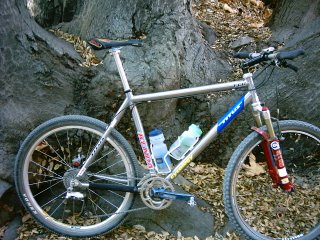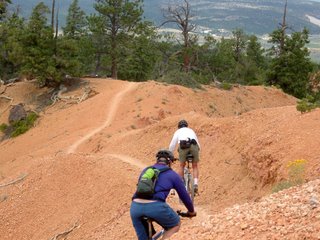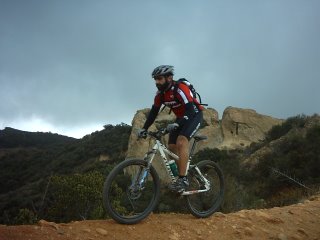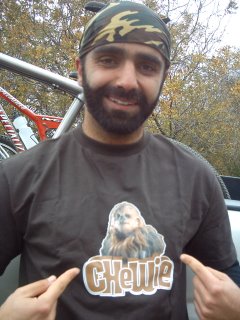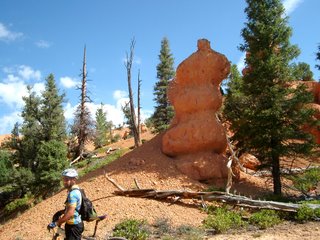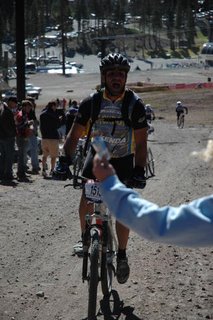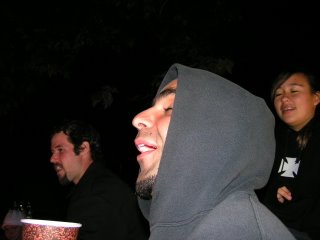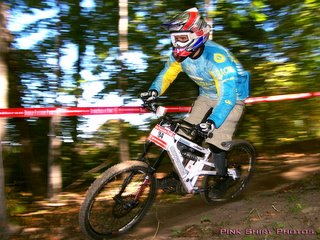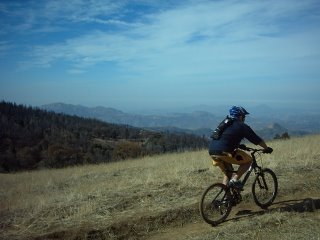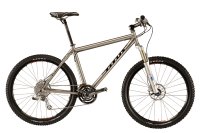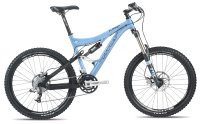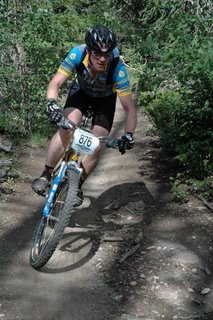This article will make King James and Jeff "Tookie" Williams giddy as school girls. Gentlemen, try not to let the size of their wheels give you "Niner Envy."
Manufacturers To Flood 29er Market in 2007
By Chris Lesser, Bicycle Retailer Magazine, Current issue
SEPTEMBER 01, 2006 -- NORTH HOLLYWOOD, CA—The growing number of manufacturers, consumers and retailers driving sales of 29-inch-wheeled bikes like to pepper talk of their favored wheel size with words like “movement” and “revolution.”
But with companies like Cannondale, GT, Jamis, KHS, Raleigh and Turner joining Kona, Orbea, Redline and the legions of small frame builders already making 29ers—and with Gary Fisher approaching its sixth year offering the big wheel—some might say the revolution already has arrived.
Chris Sugai, co-founder of Niner Bikes, sees the influx of new players to the 29er market as a good thing. “It helps legitimize the 29er movement,” he said. “It shows it’s not purely a niche game anymore—it’s not just these crazy single-speed people.”
Sugai and Steve Domahidy launched Niner Bike at Interbike in 2004 as the first company dedicated solely to making 29er mountain bikes.
The company recently upgraded to a larger facility and Sugai said business has been good. The company specs custom-drawn Easton tubesets for every frame size in its five-bike line—the latest of which is a 4.5-inch-travel, full-suspension bike. That a company can succeed catering to the high end hints at the depth of the emerging market.
Big Wheels Keep on Rolling. The popularity of 29ers has been spreading virally for some time, and while the interest in big wheels initially paralleled single speeds, it more recently has developed into a category in its own right.
To get the pulse of the 29er market look no further than the 29-inch wheel forum at Mtbr.com, which regularly ranks among the most popular of the site’s heavily trafficked message boards.
Erik Angermaier, owner of the Slippery Pig Bike Shop in Phoenix, Arizona, has had a front-row seat for the 29er revolution.
Since buying his Gary Fisher rep’s first 29er demo back in 2002, Angermaier has sold off all his 26-inch mountain bikes and now sells mostly 29ers.
Today, Angermaier can’t list all the 29er brands he carries in the same breath. Indeed, brands the casual consumer may not be familiar with—small builders like Gunnar, Lenz Sport or Sycip—have responded quickly to growing 29er demand and have reaped the benefits.
With $1 million in annual sales, Angermaier said 50 percent of his sales over $2,000 are 29ers; 75 percent of his sales in the $1,000 to $2,000 range are 29ers; and about 10 percent of his sales under $1,000 are 29ers, “but just because of lack of options.”
Ethan Grossman, owner of Black Sheep Cycles in Charlotte, North Carolina, opened for business last May and has found success selling 29ers in a market already crowded with a dozen shops.
“Twenty-niners are here to stay,” said Grossman, “but some people might be blowing the horn a little too much.” Sales of 29ers account for about a quarter of Grossman’s business.
“It takes an extra half a pedal stroke to get up to speed, the bikes lay down a little more slowly in the corners and if you’re shorter, the bikes can be unruly,” Grossman said. “But the benefits far outweigh the downsides and you adapt once you start riding them.”
Niner’s Sugai said the biggest misconception about 29ers is that they’re for bigger riders only. “But that’s patently incorrect,” Sugai said. “I’m 5 feet 6 inches and I was so impressed with 29ers, I started a company to build them.”
Now, even Trek, in its concerted post-Lance effort to spice up its mountain bike development, has entered the fray.OK, sort of. The Travis Brown-designed single-speed “69er” (not to be confused with the Carver “96er”) features a 29-inch wheel up front and a 26-inch wheel in the rear.
Purebred 29er or not, the buzz the 69er is generating smacks of the same excitement found on MTBR’s 29er forum. “Based on initial responses, I just marvel at what it seems to attract,” said Trek brand manager Zapata Espinoza. “I’ve gotten more emails and inquiries about it than any other bike in the line.”
Of course, Trek’s sibling brand, Gary Fisher, has been at it a while longer and for 2007 is adding another steel hardtail to its stable of seven 29er models.
“There is not a lot of activity over $1,000 in traditional hardtails,” said Fisher product manager Dean Gore. “But at the higher price points, 29er hardtails are just far outstripping any 26-inch hardtails.”
Full Suspension, Components Fuel the Fire. While 29ers have gained popularity with single-speed and hardtail riders, builders like Fisher, Lenz Sport, Titus and Ventana have been busy trying to satiate the growing demand for full-suspension big wheelers. For 2007, look for more full-suspension designs to keep the category growing.
Intense Cycles, for example, has already started shipping its new Spider 29, an adaptation of its popular Spider model that uses the VPP suspension design licensed from Santa Cruz. Intense founder Jeff Steber said by using geometry closer to that of a road bike, like a 74-degree headtube angle, the bike handles much more like a traditional mountain bike.
The impending spike in 29er offerings in the 2007 model year would be impossible if component makers, namely tire and fork suppliers, weren’t supporting the standard.
Panaracer and Intense are adding 29er tires to their 2007 product lines, joining companies like Continental, Kenda, Maxxis and Schwalbe. Specialized sold 29-inch tires this year, but couldn’t be pinned down on when or if the company will produce a complete bike.
Components maker WTB, which helped jumpstart the 29er movement back in 1999 with the introduction of the 29-inch Nano Raptor tire, is refining and adding to its 29er tire offerings. It will have five options, including a new 2.55-inch model, and three rim options, up from two last year. Bontrager also is supporting 29er riders with a bevy of wheel and tire options including a tubeless option due this fall.
Fork options for 29ers have been few, but are growing. Marzocchi was the first major player to jump into the category three years ago supplying original equipment forks to Gary Fisher, but the fork maker has been waiting for the demand to catch up and hasn’t put any new development dollars into 29ers.
RockShox’s 80- or 100-millimeter Reba, introduced as original equipment in 2005 and available to the aftermarket this year, were a shot in the arm for 29er development. And beginning next year, RockShox will release an original equipment version of its 130-millimeter Tora fork.
The balance of the 29er fork market is made up of White Brothers, Cannondale Lefty and converted Maverick users.
Neither Fox nor Manitou will field 29er forks for 2007, however a Manitou 29er fork is in development. Several tire companies also are holding out. And Giant isn’t jumping on the 29-inch wheel bandwagon, either.
“There are some beautiful bikes for sure, and from what we hear there’s some decent market demand,” said Giant’s communications manager Andrew Juskaitis. “But we’ve looked at it and we don’t see any reason to produce [a 29er] on technical merits. We see it strictly as a marketing thing.”
But it’s not all hype for George Wisell, who sells 29ers at Five Hills Bikes in Waterbury Center, Vermont, and runs bike29.com on the side. “It smells like full suspension did in 1997,” he said. “You can just feel it.”
VISIT www.kendausa.com for a list of their 29" tire offerings, including the Nevegal, Small Block Eight and Karma.

